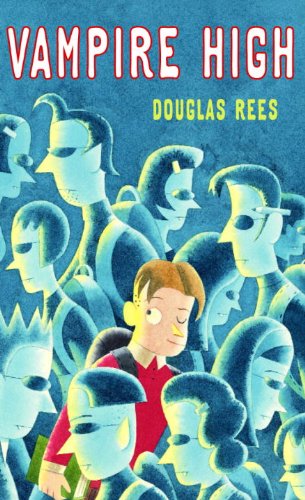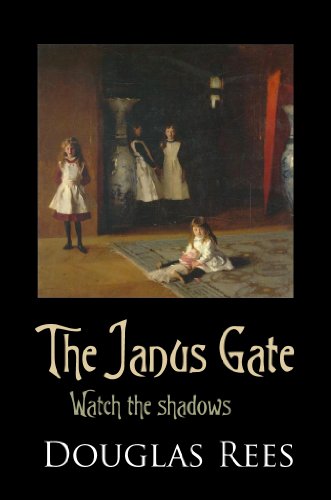-
Tyrannosaurus Rex vs. Edna the Very First Chicken
Douglas Rees, Jed Henry
eBook (Henry Holt and Co. (BYR), Sept. 26, 2017)Tyrannosaurus Rex wants breakfast. He stomps and he roars and he gnashes his teeth—and he scares all the other dinosaurs right out of the forest. Only Edna, the very first chicken, is unafraid. She won't let that bully T. rex push her around! But will Edna's mighty beak and terrible flapping wings be a match for T. rex's mighty claws and terrible jaws?This hilarious tale of bravery will have readers clucking in triumph!Jed Henry's charming illustrations accompany Douglas Rees' upROARious tale.
-
Elektra's Adventures in Tragedy
Douglas Rees
eBook (Running Press Kids, May 8, 2018)Funny and smart with all the angst and sass of adolescence and a colorful cast of characters, this is a refreshing contemporary coming-of-age YA about one Greek-American girl's odyssey home. Sixteen-year-old Elektra Kamenides is well on her way to becoming a proper southern belle in the small Mississippi college town she calls home. That is, until her mother decides to uproot her and her kid sister Thalia and start over in California. They leave behind Elektra's father--a professor and leading expert on Greek mythology, and Elektra can't understand why. For her, life is tragedy, and all signs point to her family being cursed. Their journey ends in Guadalupe Slough, a community of old Chicano families and oddball drifters sandwiched between San José and the southern shores of San Francisco Bay. The houseboat that her mother has bought, sight unseen, is really just an ancient trailer parked on a barge and sunk into a mudflat. What would Odysseus do? Elektra asks herself. Determined to get back to Mississippi at all costs, she'll beg, lie, and steal to get there. But things are not always what they seem, and home is wherever you decide to make it.
-
Vampire High
Douglas Rees
Paperback (Delacorte Books for Young Readers, July 13, 2010)It doesn’t take long for Cody Elliot to realize that his new high school is a little different. The other students are supernaturally strong, don’t like the sunlight, and are always placing orders at the local blood bank. When his new friend shows him his fangs, Cody doesn’t need any more clues—these kids are vampires! As Cody struggles to fit into this secretive community, he disrupts centuries of human-vampire segregation, with some serious—and some seriously funny—consequences.In sharp, humorous, and insightful prose, Douglas Rees creates a world of vampires where the real issue for humans is not the fear of being bitten, but the need to get along. Z+
Z+
-
Vampire High
Douglas Rees
eBook (Laurel Leaf, Feb. 19, 2009)It doesn’t take long for Cody Elliot to realize that his new high school is a little different. The other students are supernaturally strong, don’t like the sunlight, and are always placing orders at the local blood bank. When his new friend shows him his fangs, Cody doesn’t need any more clues—these kids are vampires! As Cody struggles to fit into this secretive community, he disrupts centuries of human-vampire segregation, with some serious—and some seriously funny—consequences.In sharp, humorous, and insightful prose, Douglas Rees creates a world of vampires where the real issue for humans is not the fear of being bitten, but the need to get along. Z+
Z+
-
Vampire High: Sophomore Year
Douglas Rees
eBook (Delacorte Books for Young Readers, July 8, 2010)In the satiric and funny sequel to the witty Vampire High, Cody's hopes for a great sophomore year at Vlad Dracul are dashed when his train wreck of a cousin, Turk Stone, moves in and messes with his life. Turk's a brilliant teen artist and goth with a sky-high ego . Her attitude infuriates the vampire (jenti) students, especially the dark, brooding Gregor. But something changes in Turk when she stumbles on the abandoned nineteenth-century mill in the forgotten district of Crossfield and immediately claims it as her new arts center project. Though Cody resents his cousin at first, he has his own reasons for helping make Turk's dream come true. But Crossfield has many secrets, and a mysterious vampire army called the Mercians will do anything to make sure they stay hidden. And when he takes on the Mercians, everything Cody has learned about courage and determination his freshman year at Vampire High will be tested.
-
Winged Escort
Douglas Reeman
eBook (McBooks Press, Feb. 15, 2017)As the grim years of the Second World War go by, the destruction of Allied shipping mounts. Out of the terrible loss of men and ships, the escort carrier is born. They were typically half the length and a third the displacement of larger fleet carriers. While they were slower, carried fewer planes, and were less well armed and armored, escort carriers were cheaper and could be built quickly, which was their principal advantage. At twenty-six, fighter pilot Tim Rowan, RNVR, is already a veteran of many campaigns. Now he joins the new, American-made escort (or "jeep") carrier HMS Growler, the flagship of a task force protecting Allied convoys sailing the Arctic route to supply Soviet Russia. The service in the Arctic is harrowing, and not all of Rowan's adversaries are German. In late 1944, Growler is transferred to the Indian Ocean and faces the Kamikaze, experiencing vicious onslaughts.
-
Vampire High: Sophomore Year
Douglas Rees
Hardcover (Delacorte Books for Young Readers, July 13, 2010)In the satiric and funny sequel to the witty Vampire High, Cody's hopes for a great sophomore year at Vlad Dracul are dashed when his train wreck of a cousin, Turk Stone, moves in and messes with his life. Turk's a brilliant teen artist and goth with a sky-high ego . Her attitude infuriates the vampire (jenti) students, especially the dark, brooding Gregor. But something changes in Turk when she stumbles on the abandoned nineteenth-century mill in the forgotten district of Crossfield and immediately claims it as her new arts center project. Though Cody resents his cousin at first, he has his own reasons for helping make Turk's dream come true. But Crossfield has many secrets, and a mysterious vampire army called the Mercians will do anything to make sure they stay hidden. And when he takes on the Mercians, everything Cody has learned about courage and determination his freshman year at Vampire High will be tested. Z+
Z+
-
The Janus Gate
Douglas Rees
eBook (Ambush Books, March 21, 2012)A page-turner about growing up and facing hidden fears...Everyone who looks at The Daughters of Edward Darley Boits, the grand-scale painting by John Singer Sargent that hangs in Boston’s Museum of Fine Arts, is drawn into its mysteries. Who are these four girls, dressed in prim pinafores? Why is the composition so far off balance? Why are two of the girls cloaked so completely in shadows that their “portraits” are little more than ghostly ciphers? Author Douglas Rees explores the complexities of this masterpiece with a psychological thriller that lets Sargent himself tell the story behind the canvas. When one of the girls scratches the words “HELP US” on a scrap of drawing paper, Sargent realizes that he alone has the power to save them. Will the great portraitist paint the girls as they appear—or will he show the reality of their dark, mysterious lives?From School Library JournalGrade 7 Up–In this rather gothic mystery, Rees introduces readers to a man who is frequently called the greatest American portrait artist. Sargent is the narrator of this eerie and unusual story. Early in his career, he is commissioned to paint Edward Boits four young daughters. But all is not well in the restless household. Iza Boit is known to be eccentric, and Sargent is bemused by her capriciousness and the daughters antipathy toward him. This odd scenario builds slowly and steadily into a macabre tale of spirits, demons, and possession, as the artist tries at first simply to fulfill his commission, then is drawn deeper into the dark mystery. Rees provides plenty of detail and insight into Sargents creative process as he paints this dark portrait of the four unhappy sisters. The story and the detailed reproduction of the painting on the books jacket are woven together with an atmosphere rich in foreshadowing and dread. Appendixes provide an excellent framework for the period in which Sargent painted, including a time line, a brief biographical sketch, and a list of additional resources. Readers should be sufficiently captivated to look up more information about the artist and his work.–Roxanne Myers Spencer, Western Kentucky University, Bowling GreenCopyright © Reed Business Information, a division of Reed Elsevier Inc. All rights reserved.
-
Tyrannosaurus Rex vs. Edna the Very First Chicken
Douglas Rees, Jed Henry
Hardcover (Henry Holt and Co. (BYR), Sept. 26, 2017)Tyrannosaurus Rex wants breakfast. He stomps and he roars and he gnashes his teeth―and he scares all the other dinosaurs right out of the forest. Only Edna, the very first chicken, is unafraid. She won't let that bully T. rex push her around! But will Edna's mighty beak and terrible flapping wings be a match for T. rex's mighty claws and terrible jaws?This hilarious tale of bravery will have readers clucking in triumph!Jed Henry's charming illustrations accompany Douglas Rees' upROARious tale. L
L
-
The Juliet Spell
Douglas Rees
eBook (Teen Fuse, Aug. 15, 2017)I had to play Juliet. I'd studied the part, I gave great reading, even with Bobby staring at my butt the whole time. But had I been good enough to beat Vivian? Wasn't there anything else I could do? Maybe. Maybe the old witch's spell kit I had under my bed would help level the playing field.As if. Instead of giving me that famous role, it gave me a famous person—sort of. Shakespeare. Well, Edmund Shakespeare. William's younger brother.Good thing he's sweet and helpful with the play...and—ahem—maybe a little hot. But he's from the past. Way past. Cars amaze him—cars! And cell phones? Ugh.Still, there's something about him that's making my eyes go star-crossed....
-
The Juliet Spell
Douglas Rees
eBook (Harlequin Teen, Sept. 27, 2011)I wanted the role of Juliet more than anything. I studied hard. I gave a great reading for iteven with Bobby checking me out the whole time. I deserved the part.I didn't get it. So I decided to level the playing field, though I actually might have leveled the whole play. You see, since there aren't any Success in Getting to Be Juliet in Your High School Play spells, I thought I'd cast the next besta Fame spell. Good idea, right?Yeah. Instead of bringing me a little fame, it brought me someone a little famous. Shakespeare. Well, Edmund Shakespeare. William's younger brother.Good thing he's sweet and enthusiastic about helping me with the play...andahemmaybe a little bit hot. But he's from the past. Way past. Cars amaze himcars! And cell phones? Ugh.Still, there's something about him that's making my eyes go star-crossed....
-
Vampire High
Douglas Rees
Hardcover (Delacorte Books for Young Readers, Sept. 9, 2008)It doesn’t take long for Cody Elliot to realize that his new high school is a little different. The other students are supernaturally strong, don’t like the sunlight, and are always placing orders at the local blood bank. When his new friend shows him his fangs, Cody doesn’t need any more clues—these kids are vampires! As Cody struggles to fit into this secretive community, he disrupts centuries of human-vampire segregation, with some serious—and some seriously funny—consequences.In sharp, humorous, and insightful prose, Douglas Rees creates a world of vampires where the real issue for humans is not the fear of being bitten, but the need to get along. Z+
Z+